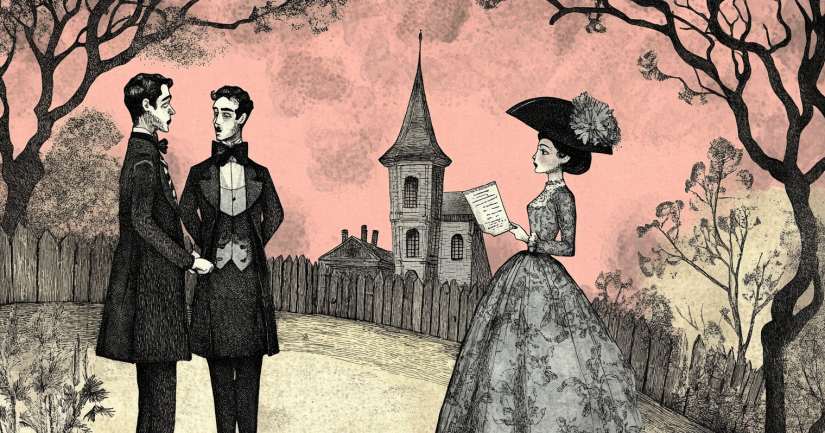
Dive into the playful wit and whimsical revelations of Oscar Wilde’s The Importance of Being Earnest Act 3 Quiz. Our Act 3 Quiz invites you to explore the witty dialogue, intriguing characters, and humorous twists that make this timeless story unforgettable. As you navigate through the questions, you will dive deeper into the clever wordplay and satire that Wilde masterfully uses to critique Victorian society.
Discover the true identities behind the double lives of Jack and Algernon. Uncover the layers of deception and irony that unfold in this final act. Will Jack finally learn the importance of being earnest, both in name and nature? Each question guides you through the pivotal moments that shape the play’s resolution.
Everything comes to a head in the play’s final act—but how well do you remember the setup? Go back and test your memory with The Importance Of Being Earnest Act 1 Quiz and The Importance Of Being Earnest Act 2 Quiz. Want the ultimate challenge? Take on the The Importance Of Being Earnest Full Book Quiz and prove your mastery of Wilde’s classic!
Try Out the The Importance Of Being Earnest Act 3 Quiz
This quiz not only tests your knowledge but also enhances your understanding of Wilde’s sharp wit and social commentary. By the end, you will appreciate the cleverness of the characters and the brilliance of Wilde’s narrative. Prepare to be both challenged and entertained. Enjoy a delightful journey through Wilde’s world of mistaken identities and social satire!
The Importance of Being Earnest Quizzes – Are you as witty as Wilde?
What Happened – The Importance Of Being Earnest Act 3
In Act 3 of The Importance of Being Earnest, several important events occur. The scene takes place in the drawing room at the Manor House. Gwendolen and Cecily confront Jack and Algernon about their false identities. Both men admit they lied about being named Ernest. This upsets Gwendolen and Cecily, who had been charmed by the name. Lady Bracknell arrives unexpectedly. She is surprised to see Cecily and learns about her large inheritance. Lady Bracknell becomes interested in Cecily as a match for Algernon.
Jack explains that he refuses to allow Cecily to marry Algernon unless Lady Bracknell permits him to marry Gwendolen. Lady Bracknell disapproves of Jack because of his unknown parentage. Dr. Chasuble arrives, and Miss Prism is revealed to have been Cecily’s governess. Lady Bracknell recognizes Miss Prism as the nurse who lost a baby 28 years ago. Miss Prism confesses that she accidentally left the baby in a handbag at Victoria Station.
Jack produces the handbag, proving he is the lost baby. This revelation means Jack is actually Lady Bracknell’s nephew and Algernon’s older brother. Jack discovers his real name is Ernest. Gwendolen accepts Jack, now that his name is Ernest. Algernon and Cecily reconcile as well. The play ends with Jack realizing the importance of being earnest.
The Importance Of Being Earnest Act 3 – Quotes
- “On the contrary, Aunt Augusta, I’ve now realised for the first time in my life the vital Importance of Being Earnest.” – Jack, ‘Jack reveals his true name and identity, resolving the play’s central conflict.’
“Never speak disrespectfully of Society, Algernon. Only people who can’t get into it do that.” – Lady Bracknell, ‘Lady Bracknell admonishes Algernon, highlighting her values and societal views.’
“I’ve now realised for the first time in my life the vital Importance of Being Earnest.” – Jack, ‘Jack’s revelation about his true name, which cleverly ties together the play’s themes of identity and deception.’
“All women become like their mothers. That is their tragedy. No man does. That’s his.” – Algernon, ‘Algernon muses on gender and familial relationships, a theme that recurs in Wilde’s work.’
“To speak frankly, I am not in favour of long engagements. They give people the opportunity of finding out each other’s character before marriage, which I think is never advisable.” – Lady Bracknell, ‘Lady Bracknell expresses her pragmatic and cynical views on marriage.’
“I never change, except in my affections.” – Gwendolen, ‘Gwendolen asserts her constancy, though ironically, she changes her mind about Jack’s identity.’
“My first impressions of people are invariably right.” – Gwendolen, ‘Gwendolen’s confidence in her judgments, despite the play’s many mistaken identities.’
“The truth is rarely pure and never simple.” – Algernon, ‘Algernon reflects on the complexities of truth and identity, central themes of the play.’
The Importance Of Being Earnest Act 3 – FAQ
Act 3 of Oscar Wilde’s The Importance of Being Earnest primarily explores the theme of identity and the absurdity of social conventions. It highlights how characters grapple with their true selves versus the personas they present to society, ultimately revealing the triviality and hypocrisy of Victorian norms.
In the final act, characters resolve their conflicts through revelations and humorous twists. Jack discovers his true parentage, which conveniently aligns with his fabricated identity. The misunderstandings and deceptions unravel, leading to reconciliations and engagements, underscoring Wilde’s satirical take on the importance of names and social status.
The revelation of Jack’s real name is significant as it ties together the play’s central theme of identity. It humorously validates his fictitious persona, Ernest, which he adopted to escape societal constraints. This twist not only resolves the plot but also reinforces Wilde’s critique of the arbitrary importance placed on names and social standing.
Wilde uses sharp dialogue, puns, and paradoxes to convey social commentary in Act 3. His clever wordplay and satirical exchanges between characters highlight the absurdity of Victorian etiquette and the trivial concerns of the upper class. Through language, Wilde effectively critiques and entertains, leaving a lasting impression on the audience.
